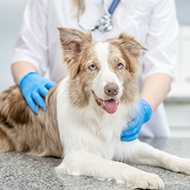
Trial aims to see whether FMT can help manage chronic enteropathy in dogs
Davies Veterinary Specialists (Davies) in Hertfordshire are looking for canine patients with chronic small intestinal diarrhoea to take part in a novel study on faecal matter transplantation.
Chronic diarrhoea in dogs is currently managed by a change in diet, the use of probiotics or antibiotics - which can risk of development of antibiotic resistant infections – or the use of immunosuppressive agents if the previous methods fail to control the signs.
This trial – which is is being conducted in association with Willows Veterinary Centre and eight other private practices or universities – aims to assess whether faecal matter transplantation (FMT) helps to resolve clinical signs of chronic diarrhoea more quickly.
Julien Bazelle, a European veterinary specialist in small animal internal medicine at Davies, said: “We are interested in seeing if FMT will help with the management of chronic enteropathy in dogs.
“The goal is to recruit, over a short period of time, canine patients with chronic small intestinal diarrhoea, for a randomised trial in which the cohort receives or not FMT at the time of the initial investigations and prior to any other treatment.”
The study is seeking dogs aged six months to ten years, with a history of chronic small intestinal diarrhoea, that have not received probiotics, antibiotics or steroids recently.
Half of the canine patients will receive FMT through a retention enema during the sedation for their routine abdominal ultrasound, while the other half will be managed without FMT.
If you have a potentially suitable patient please contact: julien.bazelle@vetspecialists.co.uk or Fergus.Allerton@willows.uk.net



 The Veterinary Medicines Directorate (VMD) is inviting applications from veterinary students to attend a one-week extramural studies (EMS) placement in July 2026.
The Veterinary Medicines Directorate (VMD) is inviting applications from veterinary students to attend a one-week extramural studies (EMS) placement in July 2026.